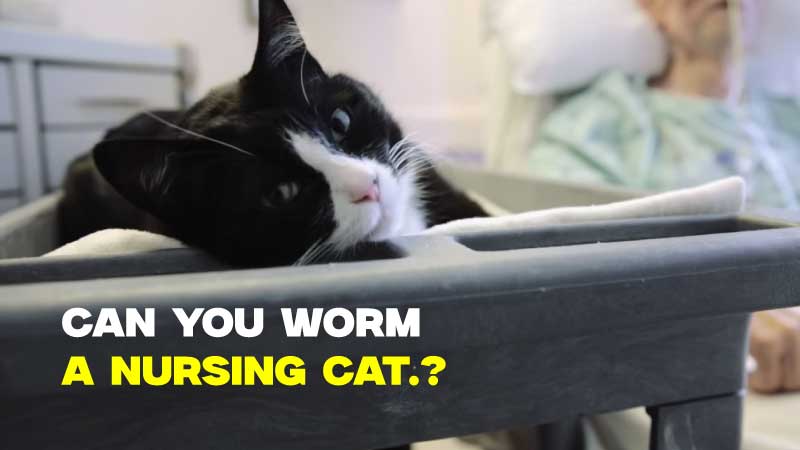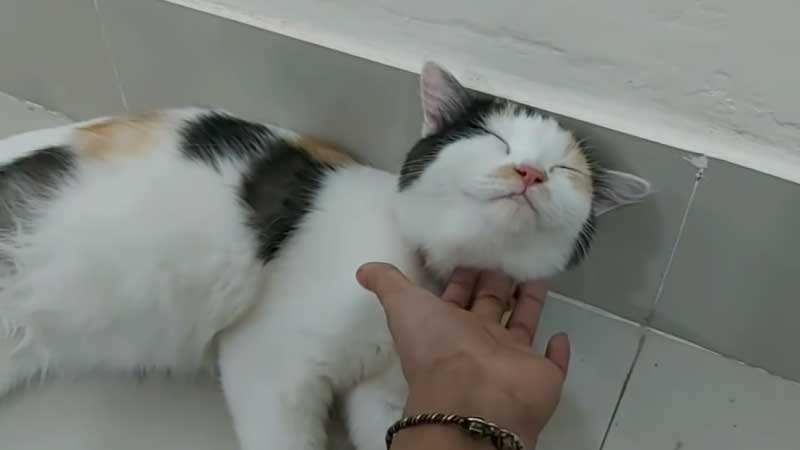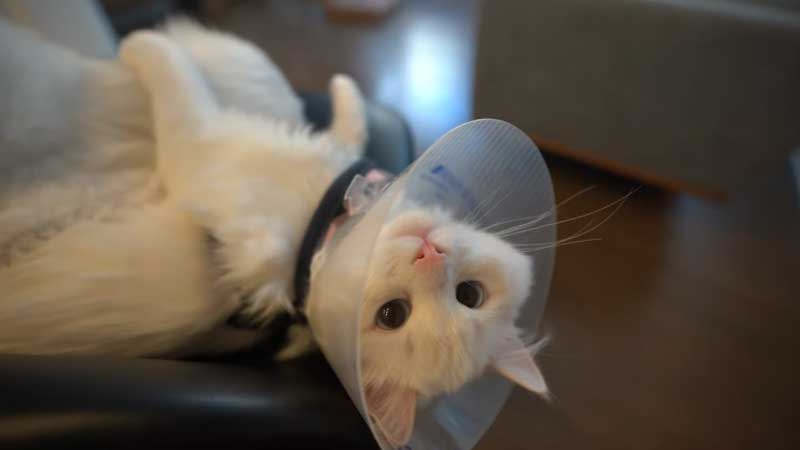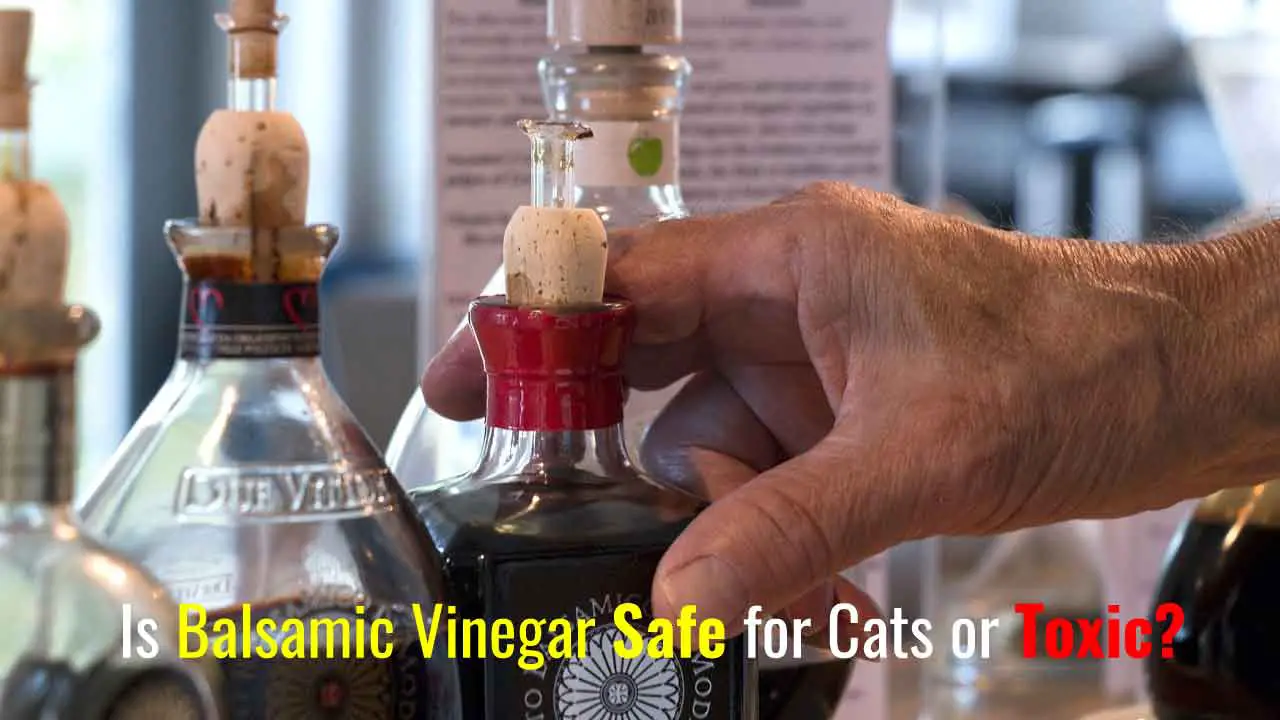It’s normal for pet parents to be concerned about their feline family members’ health and welfare, particularly when raising their younger siblings.
Now the question is, can you worm a nursing cat? The short answer is yes, you can worm a nursing cat, but it’s crucial to choose the right dewormer and follow a veterinarian-recommended schedule. Safe and effective deworming not only protects the nursing mother but also safeguards her kittens from potential parasite transmission.
In this guide, we’ll discuss the types of worms that can affect nursing cats, the safety and efficacy of various deworming medications, and the best practices to ensure the health of both the nursing mother and her kittens.
How Can I Know If My Cat Has Worms?
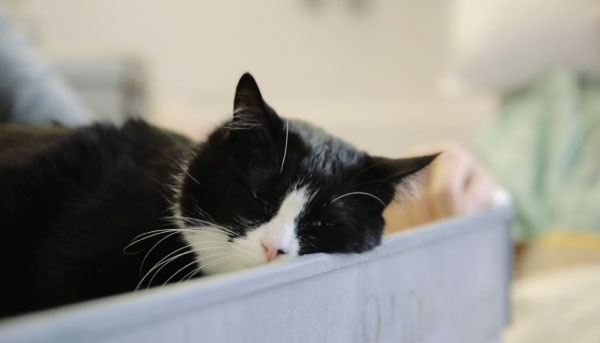
If you care about your cat’s health, you must learn about worm infestations in cats. Worms are a common problem in cats and can lead to a variety of health issues if left untreated. Here’s a brief overview of the different types of worms that can infect cats and their potential impact:
Types of Worms Commonly Found in Cats
- Roundworms: These are the most common intestinal parasites in cats. Infected cats can pass eggs through their feces, which can be a source of infection for other animals and humans.
- Hookworms: Smaller than roundworms, hookworms are blood-feeding parasites that can cause anemia, especially in kittens.
- Tapeworms: Cats usually get tapeworms from ingesting fleas that contain tapeworm larvae. Segments of these worms can often be seen near the cat’s anus or in their feces.
- Whipworms: While less common, these worms reside in the cecum and colon, causing irritation and potentially leading to bowel inflammation.
- Other Worms: Cats can also be affected by stomach worms, bladder worms, liver flukes, and heartworms, though these are less common.
Symptoms of Worm Infestations in Cats
Symptoms vary depending on the type of worm but can include vomiting, diarrhea, weight loss, a bloated abdomen, and a dull coat. In severe cases, infestations can lead to more serious conditions like anemia or intestinal blockages.
Transmission and Lifecycle
Cats can contract worms in several ways, including ingesting infected prey (like rodents or birds), contact with infected feces, or, in the case of heartworms, through mosquito bites. Kittens can contract worms from their mother’s milk.
Diagnosis and Treatment
Diagnosis usually involves a fecal exam to identify the type of worms. Treatment varies based on the type of worm but generally includes specific deworming medications. Preventative measures are important, especially in multi-pet households or where cats have outdoor access.
Risks to Humans
Some cat worms can be zoonotic, meaning they can be transmitted to humans. This is particularly a concern with roundworms and hookworms.
It’s important for cat owners to be aware of these signs and seek veterinary care if they suspect their cat has a worm infestation.
The Safety of Deworming Nursing Cats
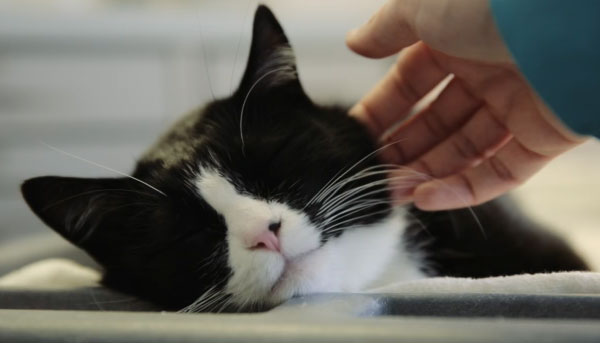
The safety of deworming nursing cats is a crucial aspect of feline healthcare, requiring careful consideration to ensure the well-being of both the mother and her kittens. Here’s a detailed look at this important topic:
Importance of Deworming Nursing Cats:
Nursing cats can pass parasites to their kittens, making deworming a vital practice for the health of both the mother and her offspring. It helps prevent the spread of parasites like roundworms and hookworms, which can affect kittens severely due to their developing immune systems.
Choosing Safe Dewormers:
Not all deworming medications are safe for nursing cats. It’s essential to use products that are specifically labeled safe for nursing mothers. Certain dewormers, while effective for adult cats, can be harmful to kittens if ingested through the mother’s milk.
Veterinary Guidance:
Always consult a veterinarian before administering any deworming medication to a nursing cat. The vet can recommend suitable products and dosages, considering factors like the cat’s weight, age, and health status.
Monitoring for Side Effects:
Although deworming is generally safe, it’s crucial to observe the nursing cat and her kittens for any adverse reactions. Side effects may include mild gastrointestinal upset, but severe reactions are rare. Immediate veterinary attention should be sought if any unusual symptoms occur.
Deworming Schedule:
The timing and frequency of deworming nursing cats are important. Typically, kittens should be dewormed every 2-3 weeks until they are about 12 weeks old. The mother should be dewormed alongside her kittens to prevent re-infestation.
Precautions with Medication:
Care should be taken to use the correct dosage to avoid overdosing. Overdosing can lead to complications in both the mother and the kittens. The type of dewormer and the amount administered should strictly follow veterinary advice.
Impact on Milk Production:
While some deworming medications can affect milk production in nursing cats, these effects are generally mild and temporary. Ensuring proper nutrition and care can help mitigate these effects.
Can You Worm a Nursing Cat: Dewormer and Schedule
| Age of Cat/Kitten | Dewormer | Frequency | Notes |
|---|---|---|---|
| Nursing Cats | Pyrantel Pamoate | Every 2-3 weeks | Safe for nursing mothers; dosage as per vet’s recommendation |
| Fenbendazole | As advised by vet | Effective against various worms; consult vet for dosage | |
| Kittens (2-3 weeks old) | Pyrantel Pamoate | Every 2 weeks | Start deworming kittens from 2-3 weeks of age |
| Kittens (up to 12 weeks) | Same as above | Every 2 weeks | Continue until kittens are 12 weeks old |
| Adult Cats (Routine care) | Varied | 1-2 times per year | Depending on lifestyle and health; consult vet for specific dewormer and schedule |
Notes:
- Consult a Veterinarian: Always consult with a veterinarian for the exact dewormer and schedule, especially for nursing cats and very young kittens.
- Dewormer Choice: The choice of dewormer may vary based on the type of worms and the health status of the cat.
- Side Effects: Monitor for any side effects and consult the vet if any adverse reactions are observed.
Different cats may have different health needs, and only a qualified veterinarian can provide the most accurate and safe deworming plan for your pets.
Preventive Measures and Environmental Hygiene
Preventive measures and environmental hygiene are key to reducing the risk of worm infestations in nursing cats and their kittens. By taking proactive steps, you can create a healthier environment for your feline family. Here are some effective strategies:
Regular Deworming Schedule:
Stick to a regular deworming schedule as recommended by your veterinarian. This is crucial for both the nursing mother and kittens, and even other pets in the household, to prevent the spread of parasites.
Maintain Clean Living Spaces:
Keep the living areas clean. Regularly clean and disinfect litter boxes, as well as areas where the cat and her kittens spend time. This helps eliminate any eggs or larvae that may be present.
Control Fleas:
Fleas are common carriers of certain types of worms, such as tapeworms. Use veterinarian-approved flea control products on your cat and in your home to minimize the risk of flea infestation and subsequent worm transmission.
Proper Disposal of Feces:
Promptly dispose of cat feces, especially from litter boxes, to reduce the risk of spreading worm eggs. This is important both inside the home and in outdoor environments where cats may defecate.
Avoid Exposure to Infected Animals:
Prevent your cats from interacting with other animals that might be infected. This is particularly important for outdoor cats, who are more likely to come into contact with infected animals or feces.
Regular Veterinary Check-ups:
Regular check-ups with a veterinarian can help catch and treat any worm infestations early on. This is also a good opportunity to discuss the best preventive measures for your specific cat and her environment.
Nutritional Support:
Provide a balanced diet to your nursing cat and her kittens. Good nutrition can help strengthen their immune systems, making them less susceptible to parasite infections.
Educate Yourself and Family:
Educate yourself and family members about the risks of worm infestations and the importance of hygiene. This includes washing hands after handling the cats or cleaning litter boxes.
Quarantine New Pets:
If you bring new pets into your home, keep them quarantined and have them checked and treated for worms before introducing them to your existing pets.
Environmental Control:
Consider environmental treatments to control potential sources of worm infestation. This might include treating the soil in your yard or using sprays that target parasites.
Frequently Asked Questions (FAQs)
Can you safely worm a nursing cat?
Yes, you can safely worm a nursing cat. However, it’s essential to choose the right dewormer that is safe for both the mother and her kittens. Always consult with a veterinarian before administering any medication.
What types of dewormers are safe for nursing cats?
Safe dewormers for nursing cats often include products containing pyrantel pamoate or fenbendazole. However, the suitability of a dewormer can depend on the specific health needs of the cat, so it’s best to get a recommendation from a veterinarian.
How often should nursing cats be dewormed?
Nursing cats should typically be dewormed every 2-3 weeks until the kittens are about 12 weeks old. This schedule can vary based on the specific health needs of the cat and the advice of a veterinarian.
What are the signs that a nursing cat has worms?
Signs that a nursing cat may have worms include vomiting, diarrhea, weight loss, a bloated abdomen, and a dull coat. In severe cases, worms can lead to more serious conditions like anemia.
Can deworming a nursing cat affect her milk production?
Some deworming medications can cause mild and temporary side effects that may affect milk production. However, these effects are usually not significant. Providing proper nutrition can help ensure that the nursing cat and her kittens receive adequate nourishment during this period.
Is it necessary to deworm the kittens as well?
Yes, it is necessary to deworm the kittens. Kittens are susceptible to worms passed from their mother and should follow a deworming schedule starting from 2-3 weeks of age, continuing every 2 weeks until they are 12 weeks old.
Can humans get worms from cats?
Yes, humans can contract certain types of worms from cats, such as roundworms and hookworms, typically through contact with contaminated feces or soil.
In Conclusion
It is safe to deworm a nursing cat, using the correct dewormer and dosage as advised by a veterinarian. This prevents the transmission of parasites to the kittens, which is crucial for their developing immune systems.
Not all dewormers are suitable for nursing cats and their kittens. Products containing pyrantel pamoate or fenbendazole are often recommended, but a veterinarian’s advice is vital in choosing the safest and most effective option.
Remember, the best course of action is always to consult with a veterinarian for personalized advice and treatment plans tailored to the specific needs of your nursing cat and her kittens. By adhering to these guidelines, you can ensure the health and happiness of your feline family.

